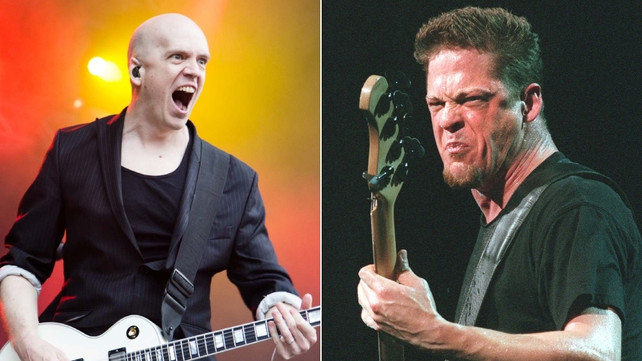Devin Townsend Opens Up on Working With Ex-Metallica’s Jason Newsted, Recalls Moment He Decided to Be a Pro Musician
“The ’80s, guitar was a competitive sport more so than a musical venture. So it became what I would imagine online gaming [is now].”

Devin Townsend reflected on the chance meeting that led him to collaborate with Metallica’s former bassist Jason Newsted, and explained the very first steps he took on the road to becoming a professional musician.
Speaking on the “Monsters, Madness and Magic” podcast in a recent interview, Devin says the story began while he was out on the road in Europe with Steve Vai in the early ’90s, when a character called Big Mick introduced himself as the sound tech for Metallica, and offer to resolve Devin and Steve’s ongoing sound issues if they took a band he managed on the road as the opening act.
As one thing led to another, Devin ended up joining the Whildhearts, the band Big Mick was managing. At one point, the manager offered to get Devin in touch with Jason after a particularly intense interaction with the Wildhearts’ lead singer (transcription via Killer Guitar Rigs):

“Big Mick and the singer from the Wildhearts had a fist fight on tour, and as Mick was leaving, he came up to me and says, ‘Listen, the guy from Metallica, Jason, does all these side projects. I think you and him would be really cool together. Do you mind if I put you in contact?’ And I was like, ‘Absolutely, that’s amazing!'”
Devin added:
“It was me, Jason, and Tom Hunting from Exodus, and then I did three or four other projects: one with Dale from The Melvins and Scott [Reeder] from Kyuss, and another one with me and the drummer from a band called Pansy Division — we did a bunch of ambient stuff.
“And it was great. It was really great. But I was also just new to a bunch of lifestyle choices that I chose to make at that time, and I don’t know if that was particularly the best thing for Jason, I, and our relationship, but… [Laughs] Here we are!”
With Metallica being much less welcoming to members doing side projects back then than it is today, Jason said last year how his collaboration with Devin was “the very origins” of the troubles that led to his eventual departure from the thrash giants.
As the bassist recalled last year, he wasn’t aware how big of a problem it was until Lars Ulrich explained to him that side projects and Metallica don’t exactly mix well (or didn’t, at the time):
“I didn’t realize at all! I didn’t know about the politics; I was just sharing some metal with my friends! I pretty much broke down on that day in front of Lars and James. I was like, ‘I’m sorry, it won’t happen again!’ And that was the first time.”
Devin’s musical origins
Elsewhere in the interview, Devin Townsend reflected on the moment he began seriously considering music as a career, comparing the ’80s rock and metal scene to what video games are to many teens today:
“I started at about 15, I’d been playing guitar for a few years, and in the ’80s, guitar was a competitive sport more so than a musical venture. So it became what I would imagine online gaming, or things like that, to be the equivalent of now, to a certain degree. So we all were fetishizing technique and I just started to really get into the acrobatics of guitar.”
He added:
“But when I was about 15, I started getting into it, and I started sending out demos to Guitar Player magazine, because they had this monthly thing where you send in a demo, it had an address, and then, if the guy who was reviewing the demo, Mike Varney, liked it, then you could be in the magazine and that particular page that these unknown guitar players were featured on, ended up being where Yngwie Malmsteen, and Paul Gilbert, and all these cats started their careers.
“So I kept sending demos and photos of myself to this poor dude, whom I met later on. It never amounted to anything, but the process of learning how to record myself ended up — when I was 18 years old, or 17 — becoming a way for me to construct a couple of demo tapes that ultimately led to me working with Steve Vai and getting signed to a label.”





